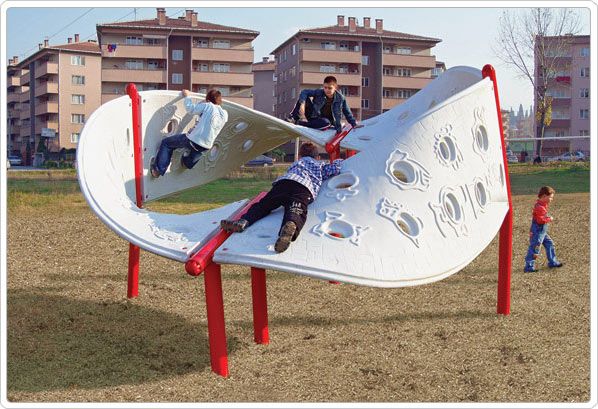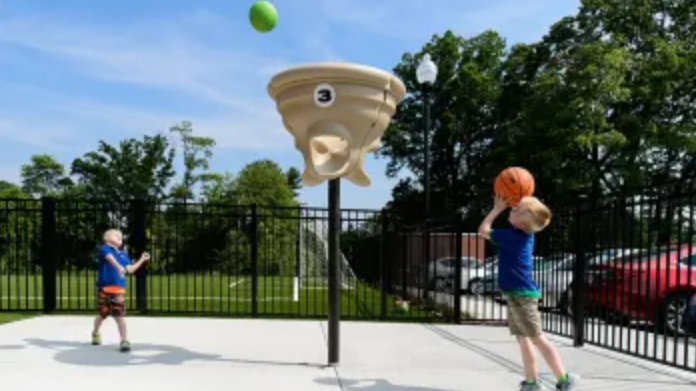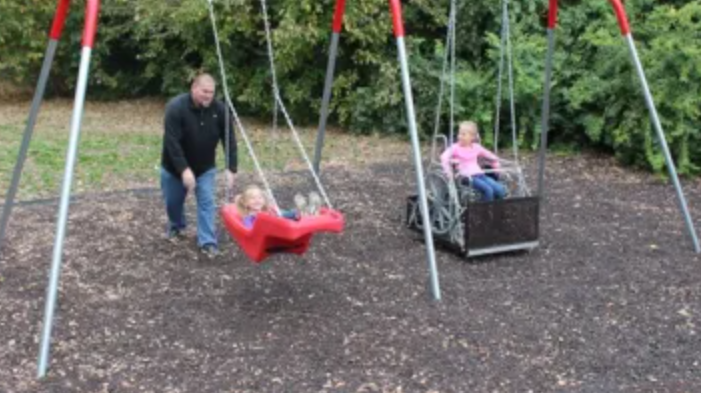For many of us, our greatest childhood memories happened outdoors.
Whether it's slaying an imaginary dragon to protect the princess or chasing friends through the woods in a game of tag, outdoor play serves a monumental role in any healthy childhood.
This article explores the importance and benefits of outdoor play in early childhood years. Exploring and playing in the outdoors gives children the opportunity to learn about the natural world and gain a stronger sense of self, all while building their skills along the way.
Keep reading to find out how EcoPlay Structures helps encourage outdoor play in your community!
The Benefits of Outdoor Play in a Child's Early Years
Outdoor play is a cornerstone of early childhood development. Engaging with natural environments gives children the freedom to learn about the world around them and its unique demands.
Here are 15 benefits of outdoor play in early childhood:
1. Promotes physical health and fitness
Engaging in activities such as running, jumping, climbing, and playing games outdoors helps children develop strong muscles and bones. These activities enhance cardiovascular health, ensuring the heart and lungs function effectively. Regular physical activity through outdoor play also helps maintain a healthy weight, reducing the risk of childhood obesity and associated health issues.
Outdoor play encourages children to move their bodies more dynamically, such as climbing trees or dodging obstacles. This type of dynamic movement can improve their balance and coordination, allowing children to enhance their overall physical competence.
The variety of activities available outdoors ensures that children can exercise different muscle groups and develop a well-rounded level of fitness.
2. Enhances childhood motor skill development
When playing outside, children encounter varied terrains and obstacles, that challenge their balance, coordination, and spatial awareness. Activities like running, jumping, climbing, and swinging naturally strengthen muscles and improve gross motor skills. Additionally, fine motor skills are honed through activities such as picking up small objects, building structures, or drawing with sticks in the dirt.
The unpredictability of outdoor settings encourages adaptive movements and problem-solving, which are essential for motor planning and execution. Playing in nature also offers sensory experiences that further refine a child's motor skills.
3. Boosts children's immune system
Outdoor play is a natural and effective way to boost children's immune systems.
Exposure to fresh air and sunlight stimulates the production of Vitamin D, an essential vitamin for a healthy immune response. Playing in diverse environments (such as parks, gardens, and forests) exposes children to a variety of microorganisms, which helps strengthen their immune systems by increasing their resistance to infections and allergies.
Engaging in high-intensity physical activities outdoors, like running and climbing, enhances overall fitness and cardiovascular health, both of which are closely linked to a healthy immune system.
Regular exercise helps to flush bacteria out of the lungs and airways, reducing the likelihood of getting colds, flu, and other illnesses. Additionally, physical activity increases the circulation of white blood cells, which are crucial for fighting off infections.
4. Improves childhood cognitive development
The outdoors provides a rich and stimulating environment for learning and growth. Engaging in activities outside stimulates curiosity and exploration, encouraging children to ask questions, solve problems, and think critically. This hands-on, experiential learning is fundamental to cognitive development.
Nature's ever-changing settings and conditions offer endless opportunities for sensory experiences, which is crucial for developing neural connections in young brains. Children learn to navigate and adapt to different terrains, fostering spatial awareness and improving their understanding of the physical world.
Social interactions during outdoor play also boost cognitive skills. Playing games, collaborating on projects, and negotiating roles in imaginative play help develop language, communication, and social reasoning abilities (more on the social benefits later). These interactions often involve complex rules and strategies, enhancing executive functions such as planning, decision-making, and self-regulation.
Furthermore, unstructured outdoor play encourages creativity and imagination, allowing children to create their own games and scenarios. This freedom to explore and invent fosters cognitive flexibility which is essential for problem-solving and innovation.
5. Encourages social interaction and cooperation
Outdoor play can be a powerful catalyst for social interaction and cooperation among children.
When children engage in outdoor activities, they naturally encounter opportunities to interact with peers in neutral settings. These interactions foster the development of essential social skills, such as communication, sharing, and empathy. Additionally, the open environment of the outdoors can naturally pique children's curiosity, encouraging them to work as a team to make new discoveries.
Whether kids are building a fort, playing a game of tag, or organizing a scavenger hunt, these activities necessitate cooperation and collective problem-solving. Children learn to negotiate roles, follow rules, and work towards common goals, which strengthens their ability to collaborate effectively with others.
Outdoor play also encourages mixed-age interactions, allowing younger children to learn from older peers and vice versa. This cross-age play enhances social learning and mentorship, promoting a sense of community and belonging. It also helps children develop conflict resolution skills as they navigate disagreements and find mutually acceptable solutions.
Overall, outdoor play provides a natural and engaging platform for children to build and refine their social skills, fostering cooperation and positive interactions in a fun and supportive environment.
6. Reduces stress and promotes emotional well-being
Playing outside significantly reduces children's stress and promotes emotional well-being by offering a natural and enjoyable outlet for energy and emotions.
Physical activity releases endorphins, the body's natural mood lifters. Outdoor play requires a level of physical exertion that helps reduce stress hormones like cortisol, leading to a calmer and more relaxed state. The natural environment itself has a soothing effect on children, as well. Exposure to green spaces, fresh air, and natural light can help lower a child's anxiety and improve their mood.
Nature provides a break from the overstimulation often found in indoor settings, offering a peaceful and refreshing atmosphere that enhances mental health. This particular benefit can be seen in educational settings especially, as outdoor time gives children a break to let out energy and re-focus.
Unstructured play in outdoor settings allows children to express themselves freely and creatively, providing a sense of autonomy and control that fosters healthier emotional coping skills as children navigate challenges and setbacks in their play.
Social interactions during outdoor activities also contribute to emotional well-being, as children build friendships and develop empathy and cooperation.
7. Stimulates childhood creativity
The natural world is a powerful stimulant for childhood creativity, providing an expansive environment where imagination can flourish. Nature offers endless opportunities for children to invent games, stories, and scenarios without the confines of structured indoor spaces. Children can transform sticks into magic wands, leaves into fairy wings, and trees into castles, fostering inventive thinking and imaginative play.
Engaging with the natural world encourages curiosity and exploration, key components of creative development. Children encounter a variety of textures, sounds, and sights, which inspire new ideas and creative solutions they can use both outdoors and in the classroom.
Building forts, designing obstacle courses, or creating nature art projects enhance problem-solving skills and resourcefulness, as children use available materials to bring their visions to life.
Outdoor play also often involves collaborative activities, where children exchange ideas and build on each other's creativity. This social aspect of play teaches them to think flexibly and incorporate different perspectives, further enriching their creative processes.

8. Improves problem-solving skills
Outdoor environments challenge children's problem-solving skills by presenting them with dynamic, real-world challenges that require adaptive thinking and resourcefulness.
The natural environment is unpredictable and varied, offering numerous opportunities for children to encounter and overcome obstacles. Whether they are navigating uneven terrain, figuring out how to climb a tree, or constructing a makeshift shelter, these experiences demand critical thinking and effective problem-solving strategies.
In outdoor settings, children often engage in imaginative play, creating complex scenarios and games. This type of play involves setting goals, devising rules, and adjusting plans as they go, all of which foster cognitive flexibility and the ability to think on their feet.
Additionally, outdoor play frequently requires collaboration, encouraging children to communicate, negotiate, and work together to solve problems, thus enhancing their social problem-solving skills.
The hands-on, experiential nature of outdoor play also allows children to learn through trial and error, building resilience and confidence in their ability to tackle challenges. This active problem-solving practice is crucial for cognitive development and prepares children to handle real-life situations effectively.
9. Teaches independence
Playing outdoors is instrumental in teaching children independence by allowing them to explore and engage with their environment autonomously.
Outdoor settings give children the freedom to make their own choices, whether it's deciding what game to play, which path to follow, or how to interact with peers. This decision-making process builds a sense of self-reliance and confidence as they learn to trust their instincts and abilities.
The challenges and adventures inherent in outdoor play require children to think and act independently. Climbing trees, navigating playground equipment, or exploring nature trails involves assessing risks, solving problems, and overcoming obstacles without immediate adult intervention. These experiences build resilience and teach children to rely on themselves.
Outdoor play encourages imaginative and unstructured activities where children create their own rules and scenarios. This type of play nurtures creativity and initiative, which are both essential components of independence. By managing their own playtime, children develop a sense of responsibility and learn the consequences of their actions, further reinforcing their independence and self-confidence.
10. Encourages sensory exploration
The natural world offers a variety of textures, sounds, smells, and sights that stimulate the senses.
When children dig in the dirt, feel the rough bark of a tree, or splash in a puddle, they engage in tactile experiences that enhance their sense of touch. The sounds of rustling leaves, chirping birds, and flowing water stimulate auditory senses, helping children differentiate between various noises and develop better listening skills. The vibrant colors and shifting patterns of clouds, flowers, and wildlife captivate visual senses, promoting attention to detail and visual tracking.
Outdoor play also exposes children to a range of smells, from fragrant flowers to earthy soil, enhancing their olfactory senses. The varying terrain and activities, like balancing on a log or swinging, engage the vestibular and proprioceptive senses, crucial for balance and body awareness.
Immersing children in multisensory outdoor environments helps them to develop stronger connections to their minds, bodies, and surroundings.
11. Enhances children's attention spans and focus
Sufficient outdoor time can significantly enhance children's attention spans and classroom focus.
The natural world is filled with intriguing sights, sounds, and activities that capture children's interest, promoting longer periods of concentration. For instance, observing insects, building sandcastles, or navigating a forest trail requires focus and persistence.
The open-ended nature of outdoor play allows children to engage deeply in self-directed activities, fostering intrinsic motivation and sustained attention. Unlike structured indoor environments, outdoor settings offer the freedom to explore and play without strict rules or time constraints, encouraging children to immerse themselves fully in their chosen activities.
Additionally, the sensory-rich outdoor environment provides varied stimuli that help to reset and refresh the brain. Exposure to natural light and fresh air, as well as physical activity, helps release pent-up energy, reducing restlessness and enhancing children's ability to focus on classroom tasks.
12. Instills a love for nature and the outdoors
Spending time in nature fosters a deep appreciation and love for nature and the outdoors.
Exploring forests, parks, beaches, or even neighborhood green spaces exposes children to diverse ecosystems, plants, and wildlife, igniting their interest in the natural world.
Through outdoor play, children develop a personal connection to nature as they observe seasonal changes, interact with animals, and discover the beauty of landscapes. Hands-on experiences like planting seeds, collecting leaves, or building forts with natural materials allow children to engage with nature actively, facilitating a sense of stewardship and respect for the environment.
13. Builds a resilient mindset
Outdoor play cultivates a resilient mindset in children by exposing them to challenges and uncertainties that encourage adaptability and perseverance.
In outdoor environments, children encounter varying terrains, weather conditions, and physical obstacles that require problem-solving and resilience. Moreover, outdoor play often involves risk-taking within safe boundaries, allowing children to learn from setbacks and develop confidence in their abilities.
Overcoming fears, such as fear of heights or darkness, builds resilience and a sense of accomplishment. Children learn to assess risks, make decisions independently, and bounce back from setbacks, fostering emotional resilience.
Additionally, outdoor play promotes physical resilience by encouraging active lifestyles and exposure to natural elements. The physical challenges of outdoor activities strengthen muscles, improve coordination, and boost overall fitness, contributing to children's resilience against physical stressors.
By engaging in unstructured outdoor play, children develop resilience not only in facing challenges but also in adapting to new situations, solving problems creatively, and maintaining a positive attitude in the face of adversity.
14. Fosters better communication
Playing outdoors can greatly improve children's communication skills through various interactive and collaborative activities that require verbal and nonverbal communication. From team sports to group explorations, outdoor play helps children learn to express their ideas, negotiate roles, and convey emotions effectively. These interactions promote language development and vocabulary expansion as children describe their surroundings or invent imaginary scenarios.
Outdoor play encourages active listening and comprehension as children interpret verbal instructions, respond to cues from peers, and follow game rules. They learn to adjust their communication style based on different social contexts, fostering empathy and understanding of others' perspectives.
Collaborative outdoor activities like building structures or solving puzzles require cooperation, enhancing teamwork skills by teaching children to communicate clearly to achieve common goals.
Overall, outdoor play provides a natural and dynamic environment that nurtures communication skills, preparing children for effective interpersonal interactions and social relationships.
15. Establishes lifelong healthy habits
Exposure to natural environments encourages children to appreciate and prioritize outdoor recreation, such as hiking, biking, or swimming, which are enjoyable and beneficial for physical health. These experiences often lead to lifelong hobbies that promote fitness and mental well-being.
Regular outdoor play supports healthy habits by reducing sedentary behavior associated with indoor activities like screen time. Instead, children learn to enjoy fresh air, sunlight, and natural surroundings, which contribute to better mood, cognitive function, and overall resilience.
Instilling a love for outdoor play early on ensures children carry healthy habits into adulthood, leading to a balanced lifestyle that includes regular physical activity and appreciation for the natural world.

How To Encourage Children to Play Outdoors
In a world full of screens, peeling kids away from a TV or tablet can be tough. Encouraging children to play outdoors can be achieved through various engaging and accessible activities, such as:
Kid-friendly hikes and trails: Choose hiking trails that are suitable for children, with manageable distances and interesting features like waterfalls or wildlife. Make it an adventure by packing snacks, binoculars for bird-watching, or a nature guide to identify plants and animals.
National and state parks: Visit nearby national or state parks that offer uniquely memorable outdoor experiences. Many parks have educational programs, ranger-led activities, and junior ranger programs that make learning about nature fun. Encourage exploration through scavenger hunts or geocaching, where children use GPS devices to find hidden treasures.
Custom playgrounds: Consider building a custom playground for your community that integrates natural elements like logs, boulders, or sand pits, providing sensory-rich play opportunities. Look for playground manufacturers that offer a wide variety of structures to choose from, such as climbing structures, swings, and interactive panels.
Kids sports teams: Many communities offer organized children's sports, such as basketball and soccer. Community sports teams can be a great opportunity for younger children to get to know peers in their local area and begin building their physical skills early.
To further encourage outdoor play, join children in their activities, emphasizing safety and exploration. Limit screen time and create a routine that includes outdoor playtime daily or weekly. Celebrate their outdoor adventures with positive reinforcement and praise, reinforcing the joy of being active outside.

EcoPlay Builds Eco-Friendly Playgrounds Children Love
If you want to make your outdoor space more enticing for kids, work with EcoPlay Structures to design an eco-friendly and custom playground. EcoPlay's playground equipment is made with inclusivity and interactivity in mind, with structures like:
Slides
Swings
Play structures
Activity panels
Climbers (both attached and freestanding)
Group activities
Inclusive activities
Freestanding activities
With 25+ years of experience in the playground industry, EcoPlay Structures can help you make outdoor play a staple in the lives of kids in your community.
Contact EcoPlay today to get started.
